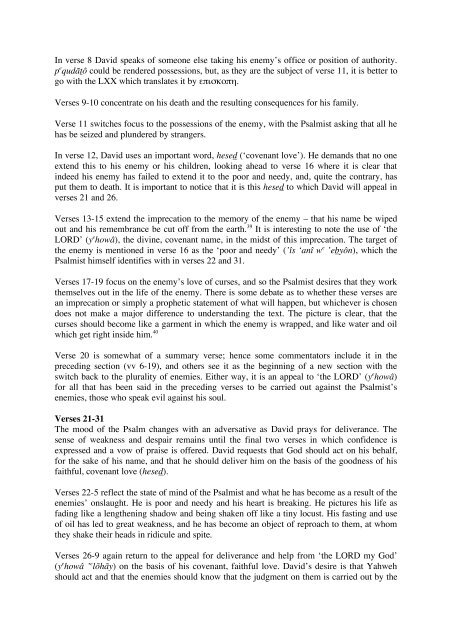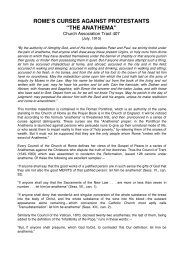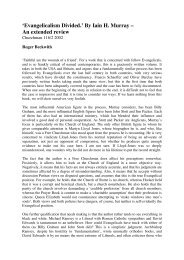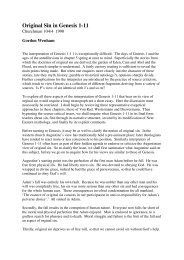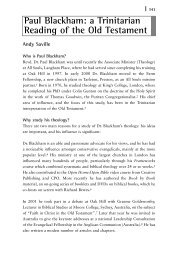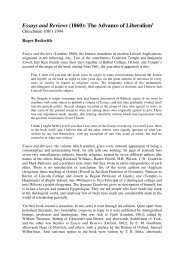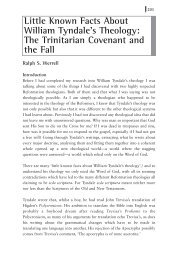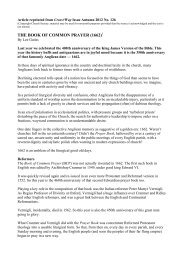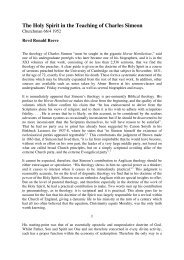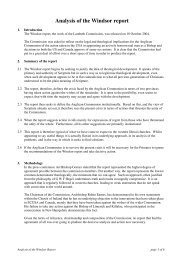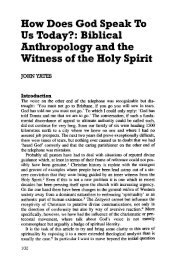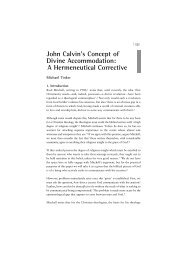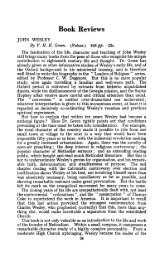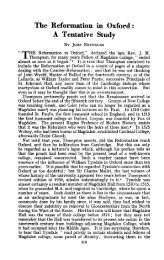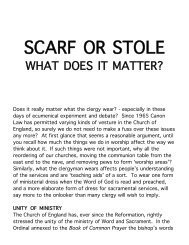The Place of the Imprecatory Psalms in the Canon ... - Church Society
The Place of the Imprecatory Psalms in the Canon ... - Church Society
The Place of the Imprecatory Psalms in the Canon ... - Church Society
You also want an ePaper? Increase the reach of your titles
YUMPU automatically turns print PDFs into web optimized ePapers that Google loves.
In verse 8 David speaks <strong>of</strong> someone else tak<strong>in</strong>g his enemy’s <strong>of</strong>fice or position <strong>of</strong> authority.<br />
p e qudãtô could be rendered possessions, but, as <strong>the</strong>y are <strong>the</strong> subject <strong>of</strong> verse 11, it is better to<br />
go with <strong>the</strong> LXX which translates it by επισκοπη.<br />
Verses 9-10 concentrate on his death and <strong>the</strong> result<strong>in</strong>g consequences for his family.<br />
Verse 11 switches focus to <strong>the</strong> possessions <strong>of</strong> <strong>the</strong> enemy, with <strong>the</strong> Psalmist ask<strong>in</strong>g that all he<br />
has be seized and plundered by strangers.<br />
In verse 12, David uses an important word, hesed (‘covenant love’). He demands that no one<br />
extend this to his enemy or his children, look<strong>in</strong>g ahead to verse 16 where it is clear that<br />
<strong>in</strong>deed his enemy has failed to extend it to <strong>the</strong> poor and needy, and, quite <strong>the</strong> contrary, has<br />
put <strong>the</strong>m to death. It is important to notice that it is this hesed to which David will appeal <strong>in</strong><br />
verses 21 and 26.<br />
Verses 13-15 extend <strong>the</strong> imprecation to <strong>the</strong> memory <strong>of</strong> <strong>the</strong> enemy – that his name be wiped<br />
out and his remembrance be cut <strong>of</strong>f from <strong>the</strong> earth. 39 It is <strong>in</strong>terest<strong>in</strong>g to note <strong>the</strong> use <strong>of</strong> ‘<strong>the</strong><br />
LORD’ (y e howâ), <strong>the</strong> div<strong>in</strong>e, covenant name, <strong>in</strong> <strong>the</strong> midst <strong>of</strong> this imprecation. <strong>The</strong> target <strong>of</strong><br />
<strong>the</strong> enemy is mentioned <strong>in</strong> verse 16 as <strong>the</strong> ‘poor and needy’ (’îs ‘anî w e ’ebyôn), which <strong>the</strong><br />
Psalmist himself identifies with <strong>in</strong> verses 22 and 31.<br />
Verses 17-19 focus on <strong>the</strong> enemy’s love <strong>of</strong> curses, and so <strong>the</strong> Psalmist desires that <strong>the</strong>y work<br />
<strong>the</strong>mselves out <strong>in</strong> <strong>the</strong> life <strong>of</strong> <strong>the</strong> enemy. <strong>The</strong>re is some debate as to whe<strong>the</strong>r <strong>the</strong>se verses are<br />
an imprecation or simply a prophetic statement <strong>of</strong> what will happen, but whichever is chosen<br />
does not make a major difference to understand<strong>in</strong>g <strong>the</strong> text. <strong>The</strong> picture is clear, that <strong>the</strong><br />
curses should become like a garment <strong>in</strong> which <strong>the</strong> enemy is wrapped, and like water and oil<br />
which get right <strong>in</strong>side him. 40<br />
Verse 20 is somewhat <strong>of</strong> a summary verse; hence some commentators <strong>in</strong>clude it <strong>in</strong> <strong>the</strong><br />
preced<strong>in</strong>g section (vv 6-19), and o<strong>the</strong>rs see it as <strong>the</strong> beg<strong>in</strong>n<strong>in</strong>g <strong>of</strong> a new section with <strong>the</strong><br />
switch back to <strong>the</strong> plurality <strong>of</strong> enemies. Ei<strong>the</strong>r way, it is an appeal to ‘<strong>the</strong> LORD’ (y e howâ)<br />
for all that has been said <strong>in</strong> <strong>the</strong> preced<strong>in</strong>g verses to be carried out aga<strong>in</strong>st <strong>the</strong> Psalmist’s<br />
enemies, those who speak evil aga<strong>in</strong>st his soul.<br />
Verses 21-31<br />
<strong>The</strong> mood <strong>of</strong> <strong>the</strong> Psalm changes with an adversative as David prays for deliverance. <strong>The</strong><br />
sense <strong>of</strong> weakness and despair rema<strong>in</strong>s until <strong>the</strong> f<strong>in</strong>al two verses <strong>in</strong> which confidence is<br />
expressed and a vow <strong>of</strong> praise is <strong>of</strong>fered. David requests that God should act on his behalf,<br />
for <strong>the</strong> sake <strong>of</strong> his name, and that he should deliver him on <strong>the</strong> basis <strong>of</strong> <strong>the</strong> goodness <strong>of</strong> his<br />
faithful, covenant love (hesed).<br />
Verses 22-5 reflect <strong>the</strong> state <strong>of</strong> m<strong>in</strong>d <strong>of</strong> <strong>the</strong> Psalmist and what he has become as a result <strong>of</strong> <strong>the</strong><br />
enemies’ onslaught. He is poor and needy and his heart is break<strong>in</strong>g. He pictures his life as<br />
fad<strong>in</strong>g like a leng<strong>the</strong>n<strong>in</strong>g shadow and be<strong>in</strong>g shaken <strong>of</strong>f like a t<strong>in</strong>y locust. His fast<strong>in</strong>g and use<br />
<strong>of</strong> oil has led to great weakness, and he has become an object <strong>of</strong> reproach to <strong>the</strong>m, at whom<br />
<strong>the</strong>y shake <strong>the</strong>ir heads <strong>in</strong> ridicule and spite.<br />
Verses 26-9 aga<strong>in</strong> return to <strong>the</strong> appeal for deliverance and help from ‘<strong>the</strong> LORD my God’<br />
(y e howâ ’ e lõhãy) on <strong>the</strong> basis <strong>of</strong> his covenant, faithful love. David’s desire is that Yahweh<br />
should act and that <strong>the</strong> enemies should know that <strong>the</strong> judgment on <strong>the</strong>m is carried out by <strong>the</strong>


